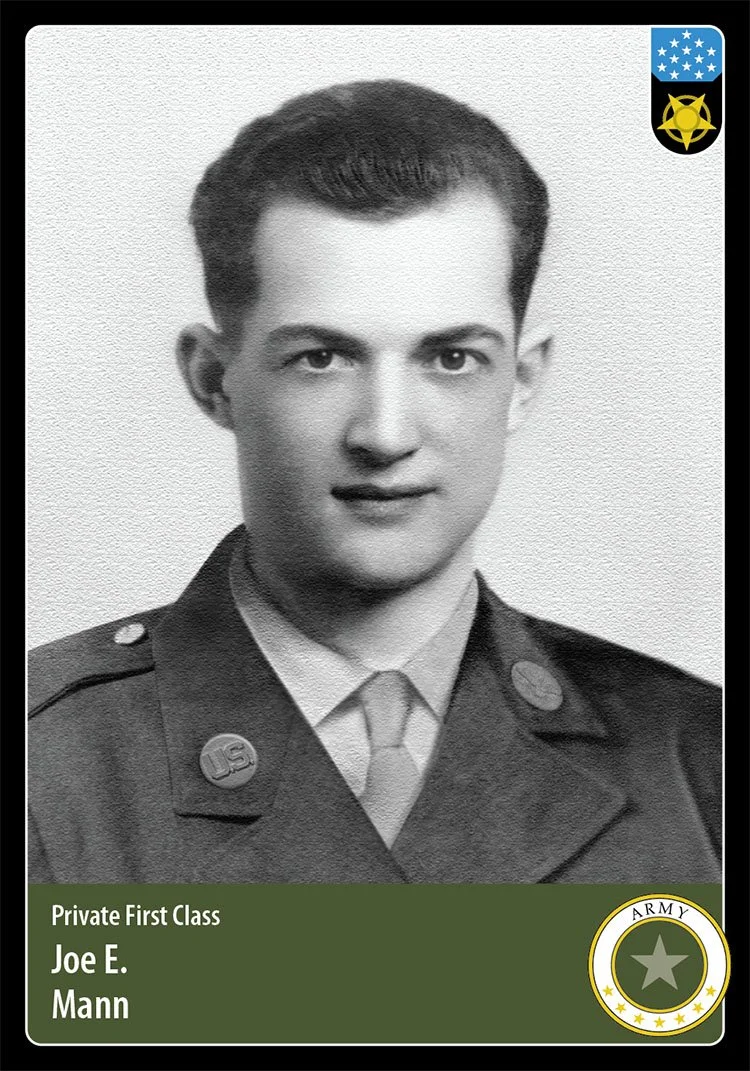Hero Card 186, Card Pack 16
Artist’s rendering by Craig Du Mez, from photos provided by the family
Hometown: Reardan, WA
Branch: U.S. Army
Unit: Company H, 502d Parachute Infantry Regiment, 101st Airborne Division
Military Honors: Medal of Honor, Bronze Star, Purple Heart (5)
Date of Sacrifice: September 19, 1944 - KIA in Best, North Brabant, the Netherlands
Age: 22
Conflict: World War II, 1939-1945
Joe Mann grew up on a wheat farm near the small town of Reardan, Washington. Born on July 8, 1922, Joe was the fifth of nine children born to John and Anna (Dueber) Mann.
During his senior year at Reardan High School in 1940-41, Mann broke his clavicle in a football game. His family recalls that Mann was told to leave the game but refused, foreshadowing the determination that would later exemplify his Army service.
Known for his ability to repair any type of machinery on the farm, Mann took a job as a carpenter with Boeing Aircraft in Seattle, Washington, after graduating from high school. In August 1942 he enlisted in the United States Army—hoping to become a military pilot like his older brothers, Roy and Jack.
Mann was, according to his family, devastated when he failed his physical exam to become a pilot. He was rejected because of “retained hardware”—a metal plate used to repair his collarbone back in high school.
Undeterred, Mann volunteered to become a paratrooper and was assigned to Company G, 506th Parachute Infantry Regiment, 101st Airborne Division. He was sent to Fort Lewis, Washington for basic training, and later to Camp Toccoa and Fort Benning, both in Georgia, for more training.
At Fort Benning, he clashed with a sergeant who didn’t like him. Just before the 101st Airborne Division left for England, the sergeant had PFC Mann transferred from the 506th to Company H of the 502nd Parachute Infantry Regiment.
In England, PFC Mann and the 101st Airborne trained for Operation Overlord—the D-Day invasion of Normandy, France. PFC Mann suffered a back injury just prior to the June 6, 1944 invasion, and would be sidelined for eight weeks as his unit participated in the largest amphibious landing in history.
Despite this setback, Mann didn’t have to wait long to see combat. The 502nd was assigned to take part in Operation Market Garden—a daring Allied plan to liberate the Netherlands, capture strategic bridges, and cross the Rhine into northern Germany.
On the second day of the battle, PFC Mann demonstrated courage, determination, and selfless sacrifice that would earn him the Congressional Medal of Honor. His citation reads:
The President of the United States of America, in the name of Congress, takes pride in presenting the Medal of Honor (Posthumously) to Private First Class Joe Eugene Mann, United States Army, for conspicuous gallantry above and beyond the call of duty while serving with Company H, 502d Parachute Infantry, 101st Airborne Division.
On 18 September 1944, in the vicinity of Best, Holland, Private First Class Mann’s platoon, attempting to seize the bridge across the Wilhelmina Canal, was surrounded and isolated by an enemy force greatly superior in personnel and firepower. Acting as lead scout, Private First Class Mann boldly crept to within rocket-launcher range of an enemy artillery position and, in the face of heavy enemy fire, destroyed an 88-mm. gun and an ammunition dump. Completely disregarding the great danger involved, he remained in his exposed position, and, with his M-1 rifle, killed the enemy one by one until he was wounded four times. Taken to a covered position, he insisted on returning to a forward position to stand guard during the night.
On the following morning, the enemy launched a concerted attack and advanced to within a few yards of the position, throwing hand grenades as they approached. One of these landed within a few feet of Private First Class Mann. Unable to raise his arms, which were bandaged to his body, he yelled “grenade” and threw his body over the grenade, and as it exploded, died. His outstanding gallantry above and beyond the call of duty and his magnificent conduct were an everlasting inspiration to his comrades for whom he gave his life.
In honor of PFC Mann, the village of Best in the Netherlands erected the Joe Mann Monument depicting his heroic actions.
Sources
Details submitted by Byrne Bennett, PFC Mann’s nephew.
Artist’s rendering by Craig Du Mez, from photos provided by the family
Operation Market Garden: Pfc. Joe E. Mann
The Spokesman-Review, April 20, 1944: Merchant Marine Guard Visits Home
HonorStates.org: Joe Eugene Mann
Military Times, Hall of Valor Project: Joe Eugene Mann
Congressional Medal of Honor Society: Joe Eugene Mann
Traces of War: Mann, Joe Eugene
Burial Site: Find a Grave





